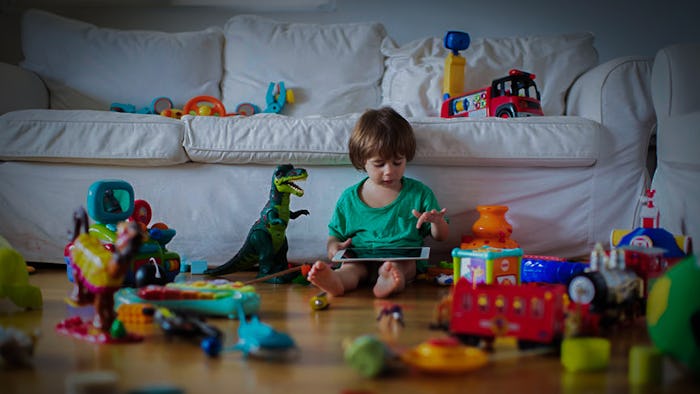Life
How To Truly Childproof Your Home, Because Every Mom Deserves A Summer Break
With summer settling in, only one thing is certain: the kids are out of school. Having your child around during the summer months can be a blessing, allowing parents ample time to bond with their children and create memories that can last a lifetime. But while the perks of having your favorite youngsters around the house are abundant, they also come with their own set of risks: with less structure comes more room for potential hazards and accidents. According to CPSC data, injuries to children ages 14 and under are most likely to happen during those summer months.
Knowing that a safe house is a happy house, the staff at Romper spoke with nationally renowned child safety and health expert Debra Holtzman J.D., M.A. to learn some tips and tricks for making sure that your home is a safe refuge for childhood fun and development all summer long.
Check Your Alarms
One way to make certain that your home is safe is to check if your home alarm systems are in working order, namely your smoke and carbon monoxide alarms. Holtzman notes, “Smoke alarms can cut your family's chances of dying in a fire by nearly half, so that's why it’s important to install smoke alarms in every bedroom, outside each separate sleeping area, and on every level of the home, including the basement.” Test these alarms monthly, change their batteries at least once a year, and replace the units every 10 years.
Secure Heavy Furniture
Beyond fires and gas, there are many regular household items which, when moved or shaken, can inflict harm upon a young child. The CPSC reports that every 30 minutes a child in the U.S. is injured as a result of a TV or furniture tip-over incident. Keeping your televisions and furniture secure is essential to keeping your children safe, as even the smallest amount of weight can cause these items to tip over. Start off by anchoring heavy items that might be prone to tipping, including “TVs, dressers, bookcases, and appliances,” says Holtzman.
Store Any Firearms Securely
If your family chooses to keep guns in the home, it’s important to take extra precautions to ensure kids don’t have access to them when you’re not around. Even kids who have been carefully coached about gun safety get curious and can put themselves or others in harm’s way. Every day in the United States, 8 kids are unintentionally injured or killed by a gun left unlocked and loaded. These tragic occurrences are known as ‘family fire’ and are highly preventable if the right safety measures are taken.
First and foremost, Holtzman suggests storing guns unloaded, locked up, out of reach, and inaccessible to children. This means keeping unloaded firearms in a locked gun safe or gun vault with the weapon’s ammunition stored separately and also locked away. Holtzman also suggests keeping the keys and lock combinations to these cabinets in a place where your child can’t access them. “Children have been known to find firearms that are ‘hidden,’ so an additional safety precaution should be followed for extra protection: Use cable-style gun locks if this type fits your firearm; otherwise, use another approved gun-locking device, such as a trigger lock,” notes Holtzman. Make sure to follow the lock’s directions and be sure to get your safety product from a reputable company.
Talk With Your Kids And Neighbors About Safe Gun Storage
Summer months mean more time for play dates, and so it’s crucial to make sure your child is entering a safe situation even when outside the home. Talk to friends and neighbors about safe gun storage, especially if your child is going over to one of their houses. Gun owners play a huge role in educating others about the risk of family fire, and having these types of conversations greatly reduces the chance of an incident occurring. “Studies show that more than 40 percent of households in the United States have a firearm in them,” Holtzman adds. Having an open dialogue with your neighbors about guns in their homes, as well as how and whether they’re securely stored, will empower you to make an educated decision on whether you want your child visiting their homes. To learn more about safe gun storage, visit EndFamilyFire.org.
Use Window Safety Devices and Cordless Coverings
Windows can also be a source of danger when it comes to children. A child can fall out of a window that is open more than four inches, and unfortunately, screens offer no protection. Install window guards or window stops on every window, but especially those on the second story or above, and use quick release mechanisms on any windows that are part of your fire escape plans. Holtzman also suggests installing cordless window coverings, as “about two kids are injured every day in window blind-related incident[s].”
Post Emergency Numbers Clearly
In any case, it is best to be prepared for an accident should it occur, and this can be done by posting emergency telephone numbers on the refrigerator and programming them into your cell phone. Holtzman suggests including the toll-free Poison Help Line (1-800-222-1222), which connects you to your local poison center, as well as the numbers of your local fire and police departments, your pediatrician, veterinarian, dentist, and family doctor.
To learn more about what you can do to prevent family fire, please visit EndFamilyFire.com.
This article is sponsored by the Ad Council and Brady.
